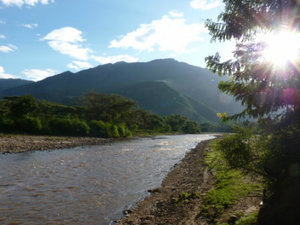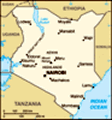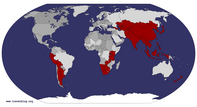Advertisement
Published: December 18th 2013


I’d been a little wary of leaving Uganda ever since we realised we’d accidentally smuggled Sam’s car into the country illicitly. The car shall henceforth be referred to as Niko (Nikololika is her full title… a Zulu name inherited from the previous owner). The Carnet de Passage document that allows Niko to move freely around Africa, a kind of car passport, is dependent upon a deposit that was paid when she left South Africa, to ensure she wouldn’t be sold in a different country. Everywhere in Africa honours this scheme, apart from Uganda (well done, Uganda… there’s always one), where the company apparently folded. The border police were seemingly unaware of this when we crossed from Tanzania. They merrily stamped the documents and sent us on our way, despite the sign pinned to the office wall (which we didn’t notice until later) declaring the scheme to be invalid in Uganda. All was well until Sam went to pay car tax in Kampala, at which point the official threatened to rip up Niko’s car passport because she was an illegal immigrant. Apparently a vast sum of money should have been deposited at the border to allow her passage. Luckily Sam didn’t have
the car with him when this confrontation occurred, so managed to extricate himself from the situation by promising to come back and sort it the next day.
Our Ugandan friends were unanimously of the opinion that the best thing to do (the only thing to do) would be ignore the problem and pay a bribe at the border on leaving the country. To attempt to correct the mistake using official channels would be a crazy Mzungu thing to do, and could only lead to more trouble. From an anti-corruption standpoint, this is shocking behaviour. The culture of bribery and corruption drags Africa down, hindering progress of all kinds. We’d already found ourselves on the wrong end of dodgy police in Kampala. It’s easy to vilify them, but government employees, including police officers, often don’t earn enough to support themselves on their salary alone. To take the moral high ground and complain about their behaviour then assume we can ignore whatever rules we like because we’re rich foreigners makes us hypocritical, and complicit. But what else could we do?
Luckily the second set of border police were as clueless as the first, rendering my slightly pretentious moral dilemma totally
irrelevant. They waved Niko through and we escaped into Kenya.
Before leaving Kampala (and reluctantly saying goodbye to the last of our friends from the course) we’d acquired two new travel buddies. Sam’s friends from home, Hugh and Fiona, who’d flown out to join him for a few weeks. Sam and Hugh had picked out Lake Turkana as our first destination in Kenya, a gorgeous sounding remote location in the little visited North of the country. I usually love the appeal of going somewhere off the beaten track, but after looking it up in the Lonely Planet I had some reservations.
The strong warrior tradition of Kenya’s local tribes can lead to some security problems… Bloody conflict continues intermittently in large parts of the North… In the final week of research for this guide, 15 people were killed in Northern Kenya during cattle raids… Convoys and armed guards are no longer needed between Marich and Turkana... I was dubious. But we now felt we knew enough about East Africa to not take everything at face value. Especially not warnings in 3 year old editions of the Lonely Planet. Friends of ours had spent a

 Cattle
Cattle
Silly cows, causing all this trouble...week on rural placement in a very similar region in Uganda just a couple of weeks before, despite the foreign office advising against all travel to the area, a fact that invalidated everyone’s insurance and meant the London School had to issue them all extra cover. The danger there, as in Northern Kenya, was tribal rivalries and cattle rustling, though the situation had been calm for some time. Cattle rustling may not sound like a huge threat to life, and perhaps traditionally it wouldn’t be, but since illegal arms started tricking over the boarder from heavily militarised Somalia and South Sudan, longstanding tribal disputes about livestock and land can rapidly escalate into serious violence.
So I looked into it. There were no travel bans in place for Northern Kenya (aside from the border directly adjacent to the Somalia, which we weren’t going anywhere near), just statements urging vigilance regarding the tribal disputes which occasionally flare up in the area. In addition to this the roads were considered unsafe at night due to general ‘banditry’, though we take this as given everywhere and never drive after dark. There were no recent news reports of any trouble in the area. I
decided I was totally happy with the idea in principle, so long as we check the situation with the locals as we go along.
Anyway, there had been terror alerts in place the whole time we’d been in Kampala, vague threats linked to the West Gate attacks in Nairobi. Security in the city was clearly amped up, and we took some extra precautions (I didn’t go to malls at the weekend, which was easy because I hate malls), but it didn’t affect us greatly. I reasoned that statistically I would still be safer in Northern Kenya
than on the back of a Boda in Kampala. So plan agreed, we set off from the border toward the scenic Marich Pass, aiming to spend the night at a campsite nearby. At a fuel stop we canvassed local opinion on time to our destination, getting wildly varied responses. People seemed a bit unsure. No one really goes that way aside from trucks carrying aid supplies across the border to warzones, and the occasional crazy mzungu. Even so, everyone agreed the road to Marich should be safe. It did seem to be safe, and very beautiful, and very rough. It became obvious that we couldn’t make our destination before nightfall,
so we stopped in the fading light at a little village just off the road.
Me and Sam have done this before in Tazania and Uganda, so we know the drill. We could write a pretty comprehensive guide to accidentally ending up in random roadside villages no foreigner has ever visited just as its getting dark. This is exactly how it goes –
1) Pull up on the main street (the only street). Wait for the crowd around your car to disperse slightly before opening the doors, as accidentally flooring a small child makes a bad first impression.
2) Introduce yourself to the most sober person in the village. They will then act as a buffer between you and the enthusiastic, curious drunks whose evening’s entertainment will be to follow you around.
3) There will be at least one person who speaks surprisingly good English, often the local teacher. Unfortunately, the sober person and the English speaking person are not always one and the same. This was the case in Kenya, where the village teacher’s English was great, aside from the slurring.
4) The hotel, when someone guides you there, will probably be a suspicious looking bar with something like HOWTEL painted on the side. Try to resist the urge to flee at this point, because it does get better. Hidden behind the suspicious looking bar will be rows of simple rooms forming a square, facing into an open courtyard. Don’t ask me why, but they’re all built to this template. Each one we’ve seen over all 3 countries has been identical. This means there’s absolutely no point trying to look at different hotels. It is unlikely that there will be more than one in each village, and if there is, they will both be exactly the same.
5) A double room will cost no more than £2. Mostly I find people are too startled by your presence to remember to try and overcharge you.
6) Yes, the rooms are about as grim as you’re imagining right now.
7) There is no shower. There may be a bucket. Electricity is optional. Mosquito nets, when available, come complete with fist sized holes.
8) Park the car in the courtyard. This is usually secure. Unfortunately in Kenya the gate was too secure, having been nailed shut some time ago. Gaining access involved the owner demolishing it with an improvised battering ram, while the local drunk attempted to assist by pelting it with stones. If you can’t drive into the courtyard, make sure the car is at least out of view of the main highway. We’ve paid a guy to keep an eye the car overnight before, when we’ve had to leave it on the street. I have no idea whether he actually bothered to watch or not, but nothing got nicked so I’m counting it a success.
9) Everyone in the village will know that you’re there, as well as who you are, where you’re from and what you do. Don’t be surprised if several random strangers approach you and shout HELLO, DOCTORS FROM ENGLAND! WELCOME!
10) Hungry? I hope you like beans.
Of course I'm mostly joking, this is a terrible generalisation based on my limited experience. I do secretly love ending up in the wrong place. It never fails to be interesting. I was mildly concerned that it might not have been what Sam’s friends had in mind for their first night in Kenya, but luckily they embraced the experience. The world ‘authentic’ was used. I couldn’t help but agree. The population of this village were especially friendly and entertaining. The lovely lady who cooked us dinner apologised sheepishly for having no clean running water for us to wash our hands with, which made me want to hug her. She brought us soap and a recently boiled kettle, clearly concerned about our sensitive foreign stomachs, since no other customers received this special treatment. We befriended the local clinical officer, who was happy to answer our nerdy questions about disease prevalence in the area. Everyone agreed that the road we were travelling on should be safe, aside from drunk teacher, who insisted there had been ‘trouble’. We didn't pay much attention to him, but we definitely should have done...
Advertisement
Tot: 0.076s; Tpl: 0.011s; cc: 12; qc: 29; dbt: 0.0363s; 1; m:domysql w:travelblog (10.17.0.13); sld: 1;
; mem: 1.1mb










